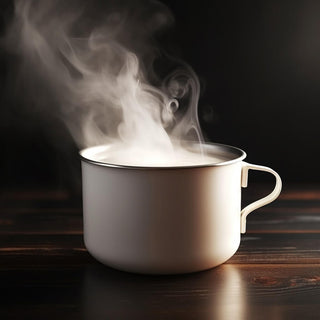When it comes to coffee, you’ll find that the array of options can be overwhelming, especially if you're new to specialty coffee.
Among the many choices, two popular espresso-based beverages are flat white and latte. While they are similar in some ways, these two beverages definitely have some subtle distinctions.
So, what’s the difference between a flat white and a latte? Let’s find out.
What Is a Latte?
Originally from Italy, the term "Latte" comes from the Italian word "caffe latte," which means "coffee with milk."
This much-loved beverage is generally made up of a shot of espresso combined with steamed milk and finished off with a small dollop of milk froth on top.
Oftentimes, it's confused with a cappuccino, but they are slightly different in that the latter contains less milk.
What Is a Flat White?
A flat white, which is said to have originated from Australia or New Zealand, contains the same ingredients as a latte but with some distinct differences.
Key Differences Between a Latte and Flat White
Milk-to-Espresso Ratio
Both drinks have a place for milk and espresso, but the proportions set them apart. A latte contains a larger proportion of milk compared to a single shot of espresso—generally, a 3:1 ratio. So, it's smoother and lighter, making it a great choice if you're still getting used to the taste of coffee.
A flat white presents a more equal partnership between milk and espresso, often a 1:1 ratio. It gives you a richer coffee experience, inviting you to taste the bold, deep flavor of espresso in a more pronounced manner.
Foam and Texture
A latte has a thicker layer of foam on top. This foam offers a glossiness and is frothy in nature, adding a kind of lightness to your latte experience.
A flat white has a much smaller layer of foam, known as 'microfoam.' This foam is velvety and dense, giving the drink a rich texture.
There's also an aesthetic difference: a latte is topped with two or three distinct layers, while flat whites are a uniform blend of milk and coffee.
Taste Profile
Because of the milk-to-espresso ratio, lattes usually have a milder flavor, which is great if you prefer your coffee on the lighter, sweeter side.
The flat white, however, has a distinctive, bolder flavor because there's more espresso in it. It's stronger and slightly heavier, offering a delightfully robust coffee experience.
Preparation
When it comes to a flat white and a latte, each carries its own signature twist in the preparation process.
For a flat white, the milk is steamed gently until 'microfoam' is achieved. This refers to the tiny, uniform bubbles that create a silky, glossy appearance in the milk. These bubbles blend seamlessly into the espresso, creating a smooth, uniform consistency throughout, allowing the unique, bold flavors of the espresso to hold center stage.
A latte, on the other hand, takes things up a notch in terms of volume. It begins with a shot of rich espresso, to which steamed milk is added, giving it its soft, mellow flavor. And then it's topped off with a layer of frothed milk.
Serving Size
Generally, lattes are served in larger cups due to the additional milk, creating a coffee drink that can be savored over a longer time. A flat white usually comes in a smaller cup. It's more concentrated, delivering a quick, impactful burst of coffee goodness.
Wrap Up
When it comes to coffee, remember, there's no one size fits all. Whether you prefer the smooth, gentle flavor of a latte, or the punchy richness of a flat white, it's all about finding the perfect fit for your palate.
Frequently Asked Questions
Does the Kind of Milk Used in a Latte or a Flat White Affect the Taste?
Yes, the type of milk can alter the taste of the coffee. Different types of milk may add subtle flavor notes that could enhance or diminish the overall taste.
If I’m Lactose Intolerant, Can I Still Enjoy a Latte or a Flat White?
Absolutely. Many dairy alternatives are available that are suitable for those who are lactose intolerant. Options include almond, soy, oat, and lactose-free milk. However, keep in mind that these alternatives may change the texture and taste of your beverage slightly.
Is There a Healthier Choice Between a Latte and a Flat White?
When it comes to health, your choice of sweeteners, additions, and types of milk can impact the calorie and sugar content. So, it's possible to make both drinks healthier with some thoughtful customization.
What About Caffeine Levels? Are There Differences Between the Two?
The caffeine levels primarily depend on the amount of espresso in your drink. Because a flat white contains a higher proportion of espresso, it might offer a bit more caffeine than a latte.
How Can I Create My Own Flat White or Latte at Home? Do I Need Special Tools?
Yes, you can absolutely create these at home. Having an espresso machine can make it easier, but there are also alternatives for brewing espresso, like using a moka pot, French press, or even a simple stovetop pot. The key lies in the quality of your coffee beans, the grind, and the temperature of the milk.
Sources
- BrewSmartly (2022, June 22). Flat White vs Latte: 6 Key Differences Between These Two Types of Coffee. Retrieved from https://brewsmartly.com/flat-white-vs-latte/
- Vinepair (n.d.). The Difference Between a Flat White and a Latte explained. Retrieved from https://vinepair.com/articles/flat-white-vs-latte-explained/
- YourDreamCoffee (2023, October 1). Flat White vs. Latte: How Do They Differ & Which Is Better?. Retrieved from https://yourdreamcoffee.com/flat-white-vs-latte/



